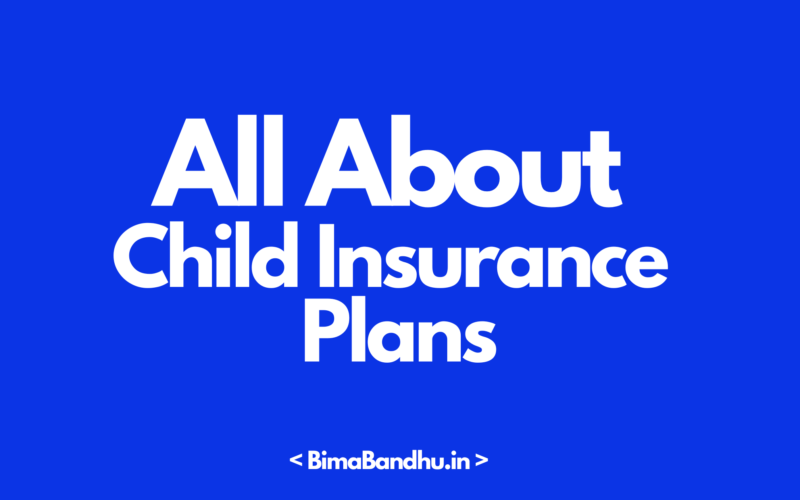For every parent, children are the most important part of their lives. They want to do every possible thing to keep their kids happy and prosperous lives. However, while maintaining the balance between earnings and expenses, many parents often find it difficult to save money for the later aspects of their kids’ lives. It is where child insurance plans help in securing a child’s life financially and address his/her future needs.
Also known as a child plan, a child insurance plan is a combination of insurance and investment plan that has been specifically designed to aid in financial planning for a child’s life. With a child insurance plan, you can secure and protect the future of your kid. It offers a lump sum payment after the policy term, along with flexible payouts for the crucial financial needs of education and others.
What is a Child Insurance Plan?
Child insurance plans are designed to provide both life cover and investment returns for the future financial requirements of your children. It helps in creating sufficient funds over a period of time and ensures maturity and death benefits payable to your children. While people do not often think of unfortunate situations like death, it is important to shield the child’s future with a child plan.
The benefits and terms of a child insurance plan differ, depending on the insurance provider you buy it from. Hence, it is crucial that you fully understand the working and advantages of investing money in a child plan. Since one of the major considerations of these plans is financial support for a child’s education, they are also referred to as child education plans.
Why You Should Buy a Child Insurance Plan?
In many cases, saving a certain amount every month is not enough for parents to build a corpus for the growing educational costs. Amidst the rising rate of education fees every year and the highly competitive environment for kids, educational expenses become hard to manage.
With child insurance plans, you get the flexibility to invest money based on the education needs and preferences of your child, your earnings, and other financial goals. Typically, you can select a plan with a life cover of around ten times the premium payable in a year and even higher.
Who All Should Buy a Child Insurance Plan?
Ideally, buying a child education plan is a must for every parent who wants to plan for the bright future of their children. You should buy a child insurance plan if you:
- Have a child aged between zero to fifteen
- Want to build a corpus to fund child education
- Want to minimize the impact of inflation on your investments
How Does a Child Insurance Plan Help in Securing a Child’s Future?
With a child insurance plan, you will enjoy the following benefits:
- Financial security during the crucial years of your child’s life
- Good returns for the investments and life cover under a single plan
- Safeguarded the financial future of your kids after the demise of parent
- Disciplined investments, which often becomes challenging for the breadwinner
What are the Benefits of a Child Plan?
Buying a child insurance plan offers a wide range of benefits, helping you make a sizeable corpus for your child in a hassle-free manner. Given below are some of the primary benefits of a child plan:
-
Disciplined investment for child education planning
A child plan will help you build a significant corpus for your kid. With timely premium payments, the resulting corpus will help meet the educational expenses in your child’s life.
-
Partial Withdrawal for medical emergencies
Many child insurance plans also provide the facility to withdraw money during the plan tenure to meet medical expenses resulting from child’s illness. Such benefits act as an add-on with health insurance in place.
-
Financial Support in case of absence of parent(s)
The consequences of an untimely demise of a parent(s) can have a lasting impact on a child’s life. But with a child plan purchased, the nominated child will receive the benefits of the plan in the form of a lumpsum amount. Besides this, he/she does not have to pay the premium ahead.
-
Regular income for child
You can also find certain child insurance plans in the market which offer regular income to the children in case of the unfortunate demise of parent(s).
-
Additional riders for enhanced benefits
Many child plans come with the option to include add-ons like premium waiver rider or personal accident rider for additional benefits. Similarly, many plans have inbuilt riders included in the base plan.
-
Loan collateral to fund child’s education
Buying a child insurance plan will help in securing an education loan easily for the higher education plans of your child. The plan can also be used as collateral for child-related borrowings.
Recommended Read: What is Insurance?
What are the Key Features of Child Insurance Plans?
- Waiver of premium facility
- Partial withdrawals
- Flexibility to select adequate sum assured
- Inflation-beating returns
- Tax benefits in the EEE (Exempt-Exempt-Exempt) category
- Available in both linked and non-linked types
- Immediate financial protection in case of loss of parent(s)
- Maturity benefits
- Flexibility to choose the right policy term
- Easy to choose specific types of funds to invest money
- Availability of riders
What are the Types of Child Insurance Plans?
Almost every insurance provider has child insurance policies available in their list of insurance products. The features and benefits of child plans may differ from one insurer to another. Given below are some of the types of child plans available in the market:
|
Type of child plans |
Benefits/Features |
| Single premium child insurance plan |
|
| Regular premium child plan |
|
| Child ULIP |
|
| Child endowment plan |
|
How is a Child Insurance Plan Different from a Pure Term Plan?
The difference between a pure term plan and a child plan can be gauged in two different scenarios – whether the parent(s) of the child survives till the plan maturity or not.
In case of a pure term plan, the death benefits are paid to the nominee, making the policy end afterwards. However, with child plans, the policy continues even after the demise of the child’s parents, making him eligible to receive the benefits as defined under the chosen plan.
If the pure term insurance policyholder survives the tenure, there is no maturity benefit. On the other hand, child insurance plans provide maturity benefits too.
Should You Buy a Child Education Plan?
The need for buying a child plan at the right time can be realized from the fact that the increasing cost of education worries every parent. Every year, millions of parents in India find it hard to pay for the education fees and other expenses from their annual income.
As of 2016, the count of households falling into the middle-income bracket was around 121 million, says Statista. On the other hand, the per capita annual income in the country stood at Rs. 1.25 Lakh approximately. Maintaining a balance between both ends is a tough task and is no less than a constant battle in many Indian homes.
Buying a child education plan helps allocate a specific sum of money for the child’s future. It will not only pay a lumpsum amount in case of the unfortunate demise of the parent but continue to invest on their behalf. The premium waiver benefit associated with child plans does not derail the investment cycle for the child in case the parent is not around.
How Does a Child Plan Work?
A child insurance plan can work in three different ways – as a ULIP, endowment policy, or money-back policy.
- The money-back plans ensure that your child will receive the insurance benefits at regular time intervals. They can also fulfil the financial needs that arise for life stage planning. However, you may not get significant returns that match or surpass the rate of inflation.
- The returns from ULIP plans are market-linked. In case of the parent’s demise, the child will receive the sum assured as a lumpsum, along with the benefit of fund value on maturity and waiver of all future premiums.
- An endowment policy is where the insured will receive a lumpsum amount with bonuses on maturity.
Let’s understand the working of these three types of child education plans with the help of an example:
Mr. Roy is a parent to a five-year-old son, and he wants to secure the kid’s future by investing money in a child plan for the next fifteen years.
Case 1>
Mr. Roy chooses a money-back policy that guarantees payment of 20% of the sum assured after every 5 years. He receives Rs. 2 lakh each after the fifth and tenth year of the policy. But he dies unfortunately in the 11th year. In this case, the nominee will receive the total sum assured of Rs. 10 Lakh regardless of the amount paid already, while the future premiums will be waived off.
On maturity of the chosen child insurance plan after the next four years, the nominee will also receive guaranteed maturity benefits.
Case 2:
Mr. Roy buys a ULIP at a premium of Rs. 1 Lakh per year with a policy period of 15 years. In case of his demise during this tenure, the insurer will waive off the remaining premiums and provides a death benefit. The plan will continue till maturity when the nominee will receive the fund value to support the educational needs financially.
Case 3:
Mr. Roy buys a traditional endowment plan for 15 years with a sum assured of Rs. 15 Lakh. In case he dies in the 8th year of the plan, the insurer will provide the death benefit of Rs. 10 lakh immediately and will waive off future premiums. When the policy matures, the insurance company will also pay the maturity benefit as defined in the plan.
**The exact benefits of any insurance plan are based on the terms defined in it. Please read the plan documents carefully.
What are the Documents required for a Child Plan?
You need the following documents at the time of buying a child insurance plan:
- Age proof – birth certificate, 10th/12th marks sheet, or passport
- Identity proof – Aadhaar card, Voter ID, etc.
- Income proof
- Address proof
- Duly filled proposal form
At the time of claim settlement, the list of documents required includes the following:
- Policy document
- Duly filled claim form
- Medical certificate
- Death certificate
- Diagnostic report/Post-mortem report
- FIR copy
- NEFT details
- Nominee KYC
How to File a Claim under a Child Insurance Plan?
Given below are the details of the claim settlement process to be followed related to child plans:
- Notify the insurance company about the incidence at the earliest online, via email, call, or by visiting the nearest branch office.
- Submit the duly filled claim form along with the required details and documents.
- A surveyor will be appointed to verify the case.
- Once the claim is approved, the insurer will transfer the benefits within 30 days of receiving the documents.
Exclusions related to a Child Insurance Plan
Child insurance exclusions refer to the instances in which the insurance provider does not offer the defined plan benefits. Some of these exclusions are:
- Suicide
- Drug or alcohol abuse
- Criminal activities
- Risky sports
Ways to Buy the Best Child Insurance Plan
Given below are handful tips you can follow to buy the best child plan for your child’s future:
- Invest in a child plan early in life to build a significant corpus
- Consider financial variables, like increase in education cost, inflation, and similar others
- Read the plan documents carefully to check its terms and conditions
- Check for the inbuilt premium waiver benefit; else opt for it with a rider
- Select partial withdrawal facility to deal with any financial emergency
Comparison Between Child Plan Vs PPF Vs Sukanya Samridhi Yojana
| Child Plan | PPF | Sukanya Samridhi Yojana | |
| Girl child age limit | No limit | No limit | Up to 10 years |
| Premature closure charges | No charges levied | 1% reduction in the interest applicable | Post office savings bank account interest |
| Premature closure criteria | No such criteria | Account holder suffering from a life-threatening disease | Extreme compassionate grounds |
| Expected rate of return | 12-14% | 7.90% | 8.40% |
| Safety of return after parent’s demise | Yes | No | No |
| Lumpsum payout facility | Yes | No | No |
List of Popular Child Plans in India
Some of the most popular child insurance plans in India are:
- Aviva Young Scholar Secure
- Bajaj Allianz Young Assure
- Bharti AXA Life Child Advantage Plan
- AEGON Life Rising Star Insurance Plan
- Birla Sun Life Insurance Vision Star Plus
- Future Generali Assured Education Plan
- Max Life Shiksha Plus Super
- Reliance Life Child Plan
- SBI Life – Smart Scholar
- TATA AIA Life Insurance Super Achiever
** BimaBandhu does not endorse any of the abovementioned insurance products. Reader’s discretion is advised. Returns are subject to change with time.
Why Read BimaBandhu to Know About Child Insurance Plans?
At BimaBandhu, we take pride in helping individuals learn more about the right child plan for their kids. You can make an informed decision only when you have obtained the required knowledge about various aspects related to a child plan.
For your child, ‘Insurance Hai Zaruri, Par Sahi Chuno’!
Child Plan FAQs
What makes a child insurance plan special?
Child plans, as insurance cum investment plans, can help you create a corpus for your child’s better future. The benefits from these plans will help your children at different life stages and support their financial education.
How important is it for you to buy a child education plan?
As a parent, you want the best to happen to your children and protect their financial future in whichever way possible. Child plans are investment tools that can make this come true. By buying a suitable child plan at the right age, you can enjoy maximum benefits in the long term.
When should I buy a child insurance plan?
Ideally, you should start searching for the best child plan after your child is born. Once you have gained a better understanding of the working and benefits of child plans, you will be in a position to make the right buying decision.
What should I consider while buying a child plan?
At the time of buying a child insurance plan, consider the following points:
- Your financial goals
- Sum assured
- Policy term
- Available fund options
How much does it cost to buy the right child plan?
Child insurance premium is determined based on several factors, including policy term, age, sum assured chosen, etc.






